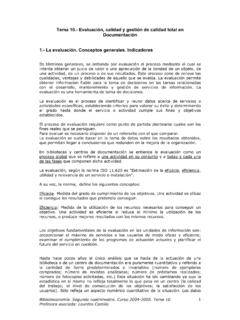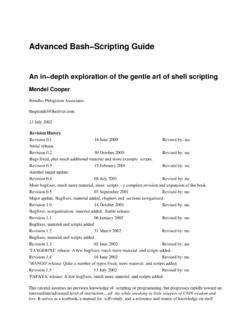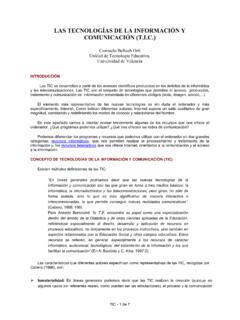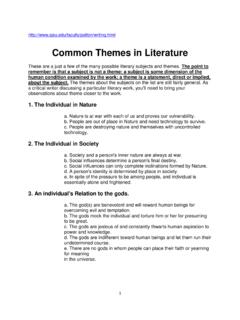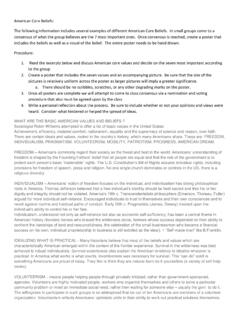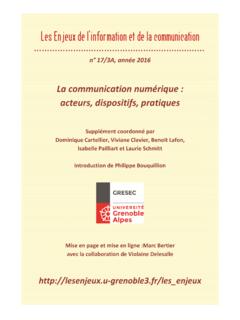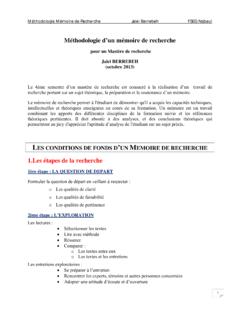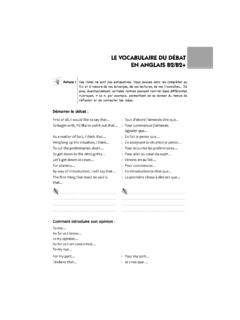Transcription of The Routledge Dictionary of Literary Terms - UV
1 The Routledge Dictionary of Literary TermsThe Routledge Dictionary of Literary Termsis a twenty-first century update of RogerFowler s seminal Dictionary of Modern Critical Terms . Bringing together originalentries written by such celebrated theorists as Terry Eagleton and Malcolm Bradburywith new definitions of current Terms and controversies, this is the essential referencebook for students of literature at all book includes: New definitions of contemporary critical issues such as Cybercriticism and Globalization . An exhaustive range of entries, covering numerous aspects to such topics as genre,form, cultural theory and Literary technique. Complete coverage of traditional and radical approaches to the study and productionof literature. Thorough accounts of critical terminology and analyses of key academic debates. Full cross-referencing throughout and suggestions for further Childsis Professor of Modern English Literature at the University ofGloucestershire.
2 His recent publications include Modernism( Routledge , 2000) andContemporary Novelists: British Fiction Since 1970(Palgrave, 2004).Roger Fowler(1939 99), the distinguished and long-serving Professor of English andLinguistics at the University of East Anglia, was the editor of the original Dictionaryof Modern Critical Terms ( Routledge , 1973, 1987).Also available from RoutledgePoetry: The BasicsJeffrey Wainwright0 415 28764 2 Shakespeare: The BasicsSean McEvoy0 415 21289 8 Literary Theory: The BasicsHans Bertens0 415 18664 1 Contemporary British NovelistsNick Rennison0 415 21709 1 The Routledge Companion toPostmodernism (Second Edition)Edited by Stuart Sim0 415 33359 8 The Routledge Companion to RussianLiteratureEdited by Neil Cornwell0 415 23366 6 Who s Who in Contemporary Women s WritingEdited by Jane Eldridge Miller0 415 15981 4 Who s Who in Lesbian and Gay WritingGabriele Griffin0 415 15984 9 Who s Who in DickensDonald Hawes0 415 26029 9 Who s Who in ShakespearePeter Quennell and Hamish Johnson0 415 26035 3 Who s Who in Twentieth-Century World PoetryEdited by Mark Willhardt and Alan Michael Parker0 415 16356 0 The Routledge Dictionary of Literary TermsPeter Childs andRoger FowlerBased on A Dictionary of Modern Critical Terms ,edited by Roger FowlerFirst published in 1973 as A Dictionary of Modern Critical TermsRevised edition published in 1987by Routledge & Kegan Paul LtdThis edition published 2006by Routledge2 Park Square, Milton Park, Abingdon, Oxon OX14 4 RNSimultaneously published in the USA and Canadaby Routledge270 Madison Ave, New York.
3 NY 10016 Routledge is an imprint of the Taylor & Francis Group Routledge 1973, 1987, 2006 All rights reserved. No part of this book may be reprinted orreproduced or utilised in any form or by any electronic, mechanical, or other means, now known or hereafter invented,including photocopying and recording, or in any informationstorage or retrieval system, without permission in writing from the Library Cataloguing in Publication DataA catalogue record for this book is available from the British LibraryLibrary of Congress Cataloging in Publication DataThe Routledge Dictionary of Literary Terms / [edited by] Peter Childs and Roger cm. Based on A Dictionary of Modern Critical Terms , edited by Roger Fowler. Rev. ed. of: A Dictionary of modern critical and enl. ed. bibliographical Literature Terminology. 2. English language Terms and phrases. 3. Literary form Terminology. 4. Criticism Terminology. I. Childs, Peter. II. Fowler, Roger. III. Dictionary of modern critical 2005803 dc222005006915 ISBN 0 415 36117 6 (hbk)ISBN 0 415 34017 9 (pbk)This edition published in the Taylor & Francis e-Library, 2006.
4 To purchase your own copy of this or any of Taylor & Francis or Routledge scollection of thousands of eBooks please go to To Claire Philpott, with thanksContentsNote on the style of referencesviiiList of termsixDictionary of Literary terms1 Notes on contributors254 Note on the style of referencesCross-references give the article to which the reader is referred in SMALL reading is suggested wherever appropriate, sometimes within the text andsometimes at the end of articles, whichever is stylistically more suitable. Dates of firsteditions are given when they are significant, but usually the most accessible andconvenient modern reprintings and translations are of termsAbsurd1 Action, actor2 Aestheticism2 Aesthetics3 Affective fallacy4 Aktualisace4 alienation effect4 Allegory4 Alliteration5 Alterity5 Ambiguity6 Analysis7 Anticlimax9 Anti-hero9 Apocalyptic literature9 Aporia10 Appreciation10 Archaism10 Archetype11 Aristotelian criticism11 Art11 Assonance11 Atmosphere11 Author12 Autobiography14 Ballad15 Baroque16 Belief18 Bildungsroman18 Biography20 Burlesque22 Cacophony23 Caricature23 Carnival23 Catastrophe23 Catharsis23 Cento(nism)
5 23 Character23 Chicago critics25 Chorus26 Classic26 Closure28 Code28 Cohesion28 Comedy28 Comedy of manners29 Comparative literature29 Competence, literary31 Complaint 31 Conceit31 Concrete poetry32 Consonance33 Context33 Contradiction34 Convention35 Couplet36 Creation37 Criticism38 Critique40 Cultural criticism41 Cultural materialism43 Culture44 Cybercriticism46 Dada48 Decentring48 Deconstruction48 Decorum51 Defamiliarization52D nouement52 Deviation52 Dialogic structure52 Diction54 Diff rance54 Difference55 Differend56 Dirge57 Disbelief57 Discourse57 Dissemination61 Dissociation of sensibility62 Documentary63 Dominant63 Double irony63 Drama63 Dramatic irony64 Ecocriticism65 criture66 Effect66 Eiron67 Elegy67 Emblem68 Epic68 Epic theatre70 Epistle72 Essay72 Essentialism73 Ethical criticism74 Euphony75 Eurocentrism75 Evaluation77 Existentialism78 Explication80 Expressionism80 Fable82 Fabula82 Fabulation82 Fancy82 Fantastic82 Farce84 Feeling85 Feminist criticism85 Fiction88 Figure90 Foot90xList of termsForegrounding90 Form91 Formalism93 Free verse94 Gender96 Generative poetics97
6 Genre97 Globalization98 Gothic99 Grammar101 Grotesque101 Hegemony102 Heresy of paraphrase103 Hermeneutics103 Hero105 Heroic couplet107 Historical novel107 Historicism108 Homophony110 Humanism110 Humours111 Hybridity112 Hyperbole113 Ideology114 Illocutionary act115 Image115 Imagination116 Imagism118 Imitation120 Implied author120 Intention120 Interior monologue121 Interpretant121 Interpretation121 Intertextuality121 Irony123 Katharsis125 Kinetic125 Lament126 Language126 Lexis128 Lisible128 Literary mode of production128 Literature129 Logocentrism131 Lyric132 Magical realism134 Mannerism135 Manners136 Marxist criticism136 Mask138 Metafiction138 Metaphor138 Metaphysical140 Metre141 Mimesis143 Mirror Stage, the143 Mock-epic144 Modernism145 Monody146 Motif146 Myth146 Mythos147 Narrative148 Narrative structure150 Narratology151 Nationalism and ethnicity studies152 Naturalism154N gritude154 Neo-Aristotelianism155 Neo-classicism155 Neo-Platonism155 New criticism155 Novel157 Objective correlative160 Obscurity160 Ode160 Onomatopoeia162 Oral composition162 Organic162 Orientalism162 Originality164 Ostranenie164 Other.
7 The164 Paradox166 Paraphrase166 Parody166 Pastiche167 Pastoral168 Pathetic fallacy169 Performativity169 Peripeteia170 List of termsxiPersona170 Phallologocentrism171 Phenomenology172 Picaresque174 Plagiarism175 Platonism175 Pleasure176 Plot177 Pluralism178 Poetic diction178 Poetic licence178 Poetics179 Poetry181 Point of view182 Polyphony182 Polysemy182 Pornography182 Postcolonialism183 Postmodernism185 Post-structuralism187 Practical criticism188 Presence188 Prose189 Protagonist190 Psychogogia190 Psychology and psychoanalysis190 Queer theory195 Reader196 Realism198 Reason200 Reception200 Refrain200 Refunctioning201 Representation202 Response202 Revisionary writing202 Rhetoric204 Rhizome205 Rhyme207 Rhythm208 Ritual208 Romance208 Romanticism209 Satire211 Scansion212 Scheme212 Scriptible212 Semiotics212 Sensibility214 Sexuality216 Short fiction217 Sign218 Simile218 Sincerity219 Skaz220 Society220 Soliloquy221 Sonnet222 Sound223 Speech224 Speech act224 Stasis224 Story224 Stream of consciousness224 Stress225 Structuralism225 Structure227 Style228 Subaltern230 Subject231 Surfiction231 Surrealism231 Suspension of disbelief232 Symbol232 Synonym233 Syntax233xiiList of termsSyuzhet235 Taste236 Technique236 Tenor236 Tension236 Text237 Texture238 Theme239 Threnody240 Topos240 Tradition240 Tragedy241 Translations243 Travesty244 Typicality244 Uncanny, the245 Undecidability246 Value248 Variation248 Vehicle249 Verbal irony249 Verisimilitude249 Vers libre249 Verse249 Verse epistle249 Voice250 Wit251 Womanist252 Writing253 AbsurdThe theatre of the absurd wasa term, derived from Camus and popular-ized by Martin Esslin s book The Theatreof the Absurd(1961), applied to a groupof dramatists whose work emerged duringthe early 1950s (though Beckett sWaitingfor Godotand Ionesco sThe Bald PrimaDonnawere actually written in the late1940s).
8 In The Myth of Sisyphus(1942)Camus defined the absurd as the tensionwhich emerges from the individual sdetermination to discover purpose andorder in a world which steadfastly refusesto evidence either. To writers like Ionescoand Beckett this paradox leaves humanactions, aspirations and emotions merelyironical. The redeeming message nolonger comes from God but is deliveredby a deaf mute to a collection of emptychairs (The Chairs, 1952); humanqualities, such as perseverance andcourage, no longer function except asderisory comments on the individual simpotence (Happy Days, 1961); basicinstincts and responses, the motor forcesof the individual, become the source ofmisery (Act Without Words, 1957). Camushimself could see a limited transcendencein the ability to recognize and even exaltin the absurd (The Outsider, 1942) or inthe minimal consolation of stoicism(Cross Purpose, 1944).
9 But he came tofeel that absurdity implied a world whichappeared to sanction Nazi brutality aseasily as it did individual acts of an examination of the nature ofabsurdity, therefore, he moved towardsliberal humanism: The end of the move-ment of absurdity, of rebellion, is to say, in the lastanalysis, love . For writers like Beckettand Ionesco such a dialectical shift wassimply faith. For to the absurd dramatistit is axiomatic that humans live in anentropic world in which communicationis impossible and illusion preferred toreality. The individual has no genuinescope for action (Hamm sits lame andblind in Endgame, 1958; Winnie is buriedto the neck in sand in Happy Days; theprotagonist of Ionesco sThe New Tenant(written 1953, produced 1957) is sub-merged beneath proliferating furniture);individuals are the victims of their meta-physical situation. Logically, the playsabandon linear plot, plausible characterdevelopment and rational language.
10 Incontrast to Camus s work their styledirectly reflects their term absurd drama , applied byEsslin to dramatists as diverse as Beckett,Ionesco, Adamov, Genet, Arrabal andSimpson, is something of a blunt had a disturbing if understandabletendency to trace the origins of theabsurd in an incredible array of writerssome of whom do not properly belong ina theatre which is convinced of theunbridgeable gulf between aspiration andfulfilment, the impossibility of communi-cation or the futility of human relation-ships. In other words he is not alwayscompletely scrupulous in distinguishingbetween style and content. In his revisededition of his book, however, he hasshown a commendable desire to underlinethe deficiencies of a term which, whileproving a useful means of approachingdramatists intent on forging new drama,was never intended as a substitute for strin-gent analysis of the work of Martin Esslin, The Theatre of theAbsurd(2004); J.


